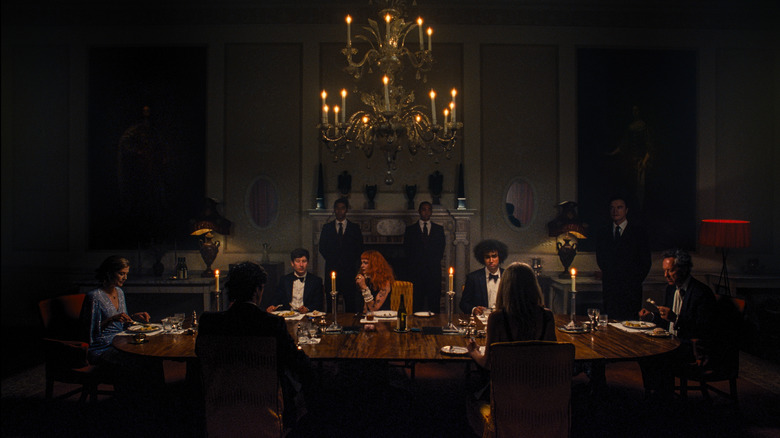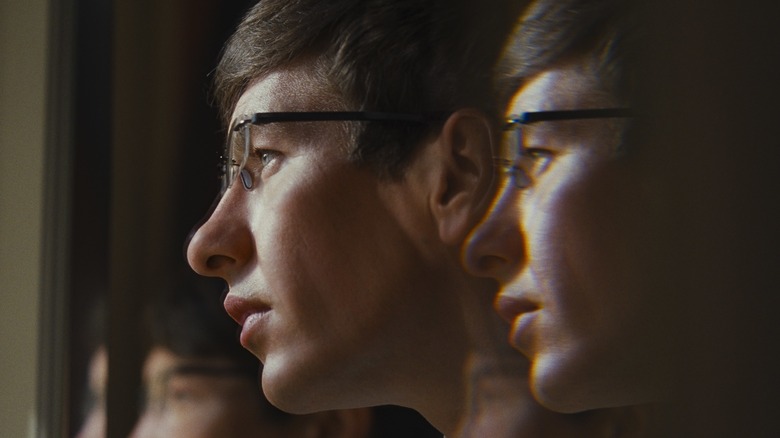Saltburn Review: A Gorgeous Film That Lacks In Subtlety
- Gorgeous set design and cinematography
- Strong performance from the always-great Barry Keoghan
- Narrative has no subtlety
- Third act undermines the rest of the film
At a certain point, you just have to bow down before Barry Keoghan, who is one of the most interesting actors working today. In "Saltburn," he does what Keoghan does best, and is spectacularly off-putting throughout the entire film. Sure, "Saltburn" may be a store-brand version of films like "Teorema" or "The Talented Mr. Ripley." (Although to be fair, plenty of 1990s audiences wrote off "The Talented Mr. Ripley" as a generic version of "Purple Noon.") And yeah, director Emerald Fennell has never been one to use subtext when she could loudly declare her intentions instead. These are undeniable qualities of "Saltburn," but that doesn't mean that they're flaws, per se.
Fennell delivers us an unsubtle but gorgeously-shot take on class structure that never fails to engage the audience, even when they're being perpetually wrong-footed. Although "Saltburn" is let down by a third act that is interesting but contradicts everything that came before it, you have to stand up and salute a film that's so eager to have "weird" and "horny" be its key descriptors.
Infiltrating the upper class
When Oliver Quick (Barry Keoghan) arrives at university, he doesn't have an easy time fitting in. He's owlish and shy, unable to break into the cliques that have already been established years earlier at Eton or Harrow. So when he finds an in with the popular, gregarious, disgustingly rich Felix Catton (Jacob Elordi), he grabs onto it with both hands and hangs on for dear life. Being part of Felix's inner circle offers social opportunities that the working-class Oliver never could have imagined, and he's not willing to let them go. When Felix invites him to spend part of the summer at his family's palatial manor, he happily accepts, even though it's clear from his first moments at Saltburn that he's out of his depth. But as he ingratiates himself to the Catton family, his desperate need to win them over and become part of their world might hide other, more complicated intentions.
The depiction of class in "Saltburn" is on-the-nose, but still intriguing. To the Catton family, someone like Oliver is a curiosity — there's nothing they can't afford to buy, so they instead become collectors of anecdotes and peculiar acquaintances. Oliver, with his story of rising from drug-addicted parents to study at Oxford, has a novelty factor that holds their interest, at least for a while. Oliver understands this, and he carefully molds himself into what each member of the family needs him to be, a chameleon built to win over the upper crust. As titled, impossibly wealthy members of the nobility, the Cattons — and by extension the whole of upper-class Britain — hold all the cards over people like Oliver. But their position at the top of the social food chain also makes them weak, and all too easy to manipulate.
Barry Keoghan as everyone's favorite, weird little weasel
Barry Keoghan proves his immense talent once again in "Saltburn." As Oliver, he masks his ambitions with shyness and social awkwardness, presenting the image of an affable nobody who's just happy to have a friend. He's quiet and unassuming, but always listening, always thinking. It's a performance of a performance, and he commands every inch of the screen. Jacob Elordi — who is currently having one hell of a year, between this and "Priscilla" — is intensely charming as the wealthy golden boy who is personable and generous in part because it costs him nothing.
As Felix's mother, Rosamund Pike walks away with the film's best lines, frequently entering a scene just to say something particularly cutting and then disappearing again. Archie Madekwe puts in an empathetic performance as Farleigh, another character who is trapped between worlds as one of the Catton family's poorer relations. He has been raised to be part of high society, to expect certain things as his birthright, but unable to avoid the fact that everything he has is given to him by the Cattons out of the goodness of their hearts, and can be taken away just as easily.
Despite the film's many interesting components, it takes a serious misstep during its final act — one that undermines the story it had been telling up until that point. As a result of this, "Saltburn" ends up feeling like two different films: one in which Oliver is dominated by obsession and one in which his ambition colors everything. Both are perfectly valid narrative choices, but they don't quite meet up in the middle, leaving the conclusion a little jarring and unsatisfying. So "Saltburn" turns out to be a bit of a mixed bag. You can't really fault any of the performances or the aesthetic choices, but it feels like a film that is tailor-made to be divisive. Some audiences may buy into its wackier plot points, others will likely feel that it goes too far, and still others will argue that it doesn't go far enough. Still, it's hard not to appreciate a film that swings for the fences as hard as this one does.
"Saltburn" premieres in theaters on November 17.


